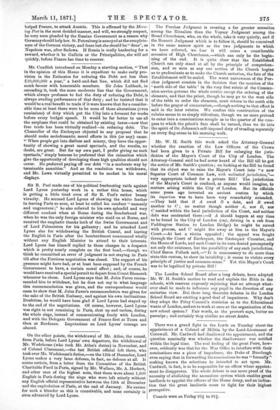Mr. W. H. Smith this week asked the Attorney-General whether
the sanction of the Law Officers of the Crown had been given to a Private Bill for enlarging the juris- diction of the Mayor's Court of the City of London. The Attorney-General said he had never heard of the Bill till he got the notice of Mr. Smith's question ; on looking at the Bill he found that its object was to raise the Mayor's Court into "a new Superior Court of Common Law, witk unlimited jurimlietion,"— very appropriate indeed for a private Bill! The jurisdiction of the Mayor's Court is confined, as anyone would imagine, to matters arising within the City of London. But its officials some years ago invented an ancient custom by which its imperium was to have been very remarkably extended. —They held that if A owed B a debt, and B owed another to C; no matter though neither A, nor B, nor C resided within the local jurisdiction of the Court, and neither debt was contracted there ;—if A should happen at any time to be found in the City of London (say, driving in a cab from Paddington Station to London Bridge) he might be served with process, and C might fire away at him in the Mayor's Court.—At last a victim appealed ; the appeal was fought through the Court of Exchequer, the Exchequer Chamber, and the House of Lords, and each Court in its turn denied peremptorily not only the existence, but the possibility of any such jurisdiction. Chief Baron Pollock said,—" It is unnecessary to do more than state this custom, to show its invalidity ; it seems to violate every principle of justice and common-sense." Yet this Mayor's Court was to be legalized by private Bill !


































 Previous page
Previous page